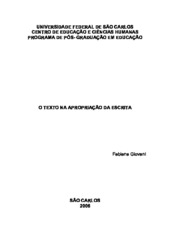Mostrar el registro sencillo del ítem
O texto na apropriação da escrita
| dc.contributor.author | Giovani, Fabiana | |
| dc.date.accessioned | 2016-06-02T19:38:45Z | |
| dc.date.available | 2007-07-10 | |
| dc.date.available | 2016-06-02T19:38:45Z | |
| dc.date.issued | 2006-07-03 | |
| dc.identifier.citation | GIOVANI, Fabiana. O texto na apropriação da escrita.. 2006. 147 f. Dissertação (Mestrado em Ciências Humanas) - Universidade Federal de São Carlos, São Carlos, 2006. | por |
| dc.identifier.uri | https://repositorio.ufscar.br/handle/ufscar/2393 | |
| dc.description.abstract | The main objective of this work is to understand the process of acquiring the writing system which children from the outskirts underwent during the literacy period. It was a peculiar situation in which the teacher, by using the enunciation theory as the foundation for her practice, became a researcher and constructed a corpus of analysis from the texts written by the children a material developed without aiming to be transformed into an academic research. The theoreticalmethodological presupposition of this qualitative investigation refers to a tracing paradigm of analysis which was established within the ambit of Human Sciences and enabled an analysis based on the traces present in the children s texts. The search for traces was related to the conditions or context in which the texts were produced, as well as to the set of stable characteristics of the discursive genre and the writing of the words. Consonant with these pillars which guided the sight to the texts is the choice for the theoretical referential mainly represented by Mikhail Bakhtin. From the traces in the texts, it was possible to comprehend that, in addition to the acquisition of the written language itself, there was a significant understanding of other relevant elements of language, such as the discursive genres which are present in our society, especially the written ones. Thus, in the end of the year, the children were shown to achieve autonomy when choosing a genre in an enunciation. Another trace which must be highlighted is the process by which the children manipulated a word and related it to the context in which they were involved. It was possible to observe that the words of others were dialogically reelaborated within my words of others through a process of utilizing different words of others , thus leading to the creation of my own words . In summary, this study provides evidence that carrying out a work aimed to guarantee the right to the written word for everyone is a viable way of establishing a dialog among unique and free subjects who understand, from the first contacts with writing, the meaning and the sense of the word equality . | eng |
| dc.format | application/pdf | por |
| dc.language | por | por |
| dc.publisher | Universidade Federal de São Carlos | por |
| dc.rights | Acesso Aberto | por |
| dc.subject | Lingüística | por |
| dc.subject | Alfabetização | por |
| dc.subject | Gêneros discursivos | por |
| dc.subject | Produção textual | por |
| dc.title | O texto na apropriação da escrita | por |
| dc.type | Dissertação | por |
| dc.contributor.advisor1 | Reyes, Cláudia Raimundo | |
| dc.contributor.advisor1Lattes | http://genos.cnpq.br:12010/dwlattes/owa/prc_imp_cv_int?f_cod=K4793476E9 | por |
| dc.description.resumo | Este trabalho tem por objetivo geral compreender o processo de apropriação do sistema de escrita pelo qual percorreram crianças de uma periferia urbana durante o período de alfabetização. Tratase de uma situação peculiar em que a professora, que utilizou como fundamento de sua prática a teoria da enunciação, torna-se pesquisadora e adota como corpus de análise os textos que as crianças foram construindo no decorrer do percurso - um material constituído sem qualquer intuito de ser transformado em pesquisa acadêmica. É uma investigação de natureza qualitativa realizada a partir de pressupostos teórico-metodológicos referentes a um paradigma indiciário de análise desenvolvido no âmbito das ciências humanas que permite análises a partir de indícios encontrados no material em questão. A busca de indícios refere-se às condições ou contexto em que foram produzidos os textos, ao conjunto de características estáveis do gênero discursivo trabalhado e a escrita da palavra nos mesmos. Consoante a estes pilares, que direcionam o olhar para os textos, está a escolha pelo referencial teórico, cujo principal representante é o estudioso Mikhail Bakhtin. A partir das pistas deixadas nos textos, pôde-se depreender que, ademais da apropriação da língua escrita, propriamente dita, houve um significativo conhecimento sobre outros elementos de grande relevância como, por exemplo, os gêneros discursivos, em especial os escritos, que circulam em nossa sociedade. Assim, ao final do ano as crianças demonstravam autonomia ao escolherem o gênero de sua opção em uma enunciação. Outro elemento que merece ser destacado, e que foi indiciado nos textos, é com relação ao processo de manipulação da palavra pelas crianças e sua relação com o contexto do qual faziam parte os sujeitos em questão. Foi possível assistir as palavras alheias serem reelaboradas dialogicamente em minhas-alheias palavras com o auxílio de outras palavras alheias e em seguida transformarem-se em minhas palavras, já de índole criadora. Tudo isso evidencia que, realizar um trabalho de devolver o direito à palavra escrita a TODOS os sujeitos da sociedade é o caminho da busca do diálogo constitutivo de sujeitos únicos e livres que conheçam, desde os primeiros contatos com a escrita, o significado e sentido da palavra igualdade . | por |
| dc.publisher.country | BR | por |
| dc.publisher.initials | UFSCar | por |
| dc.publisher.program | Programa de Pós-Graduação em Educação - PPGE | por |
| dc.subject.cnpq | CIENCIAS HUMANAS::EDUCACAO | por |
| dc.contributor.authorlattes | http://buscatextual.cnpq.br/buscatextual/visualizacv.do?id=E9234651 | por |
